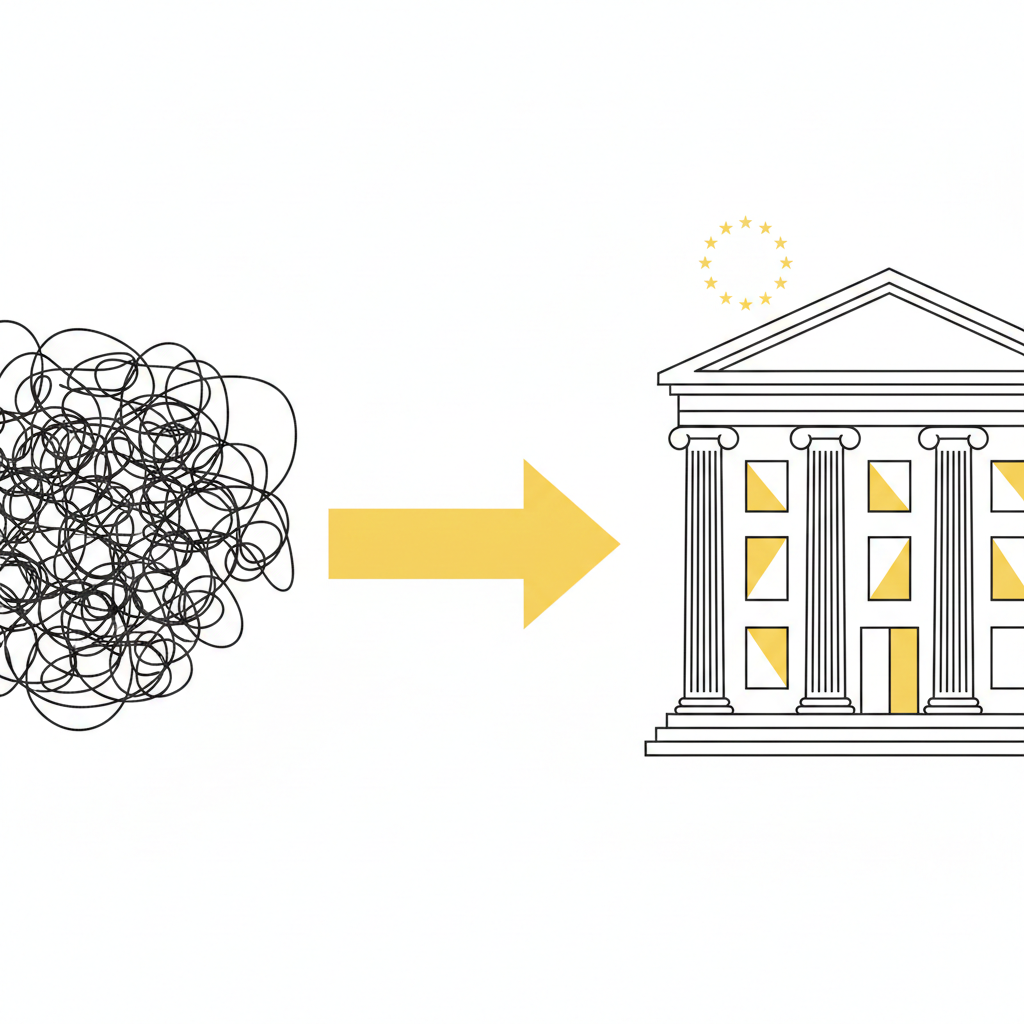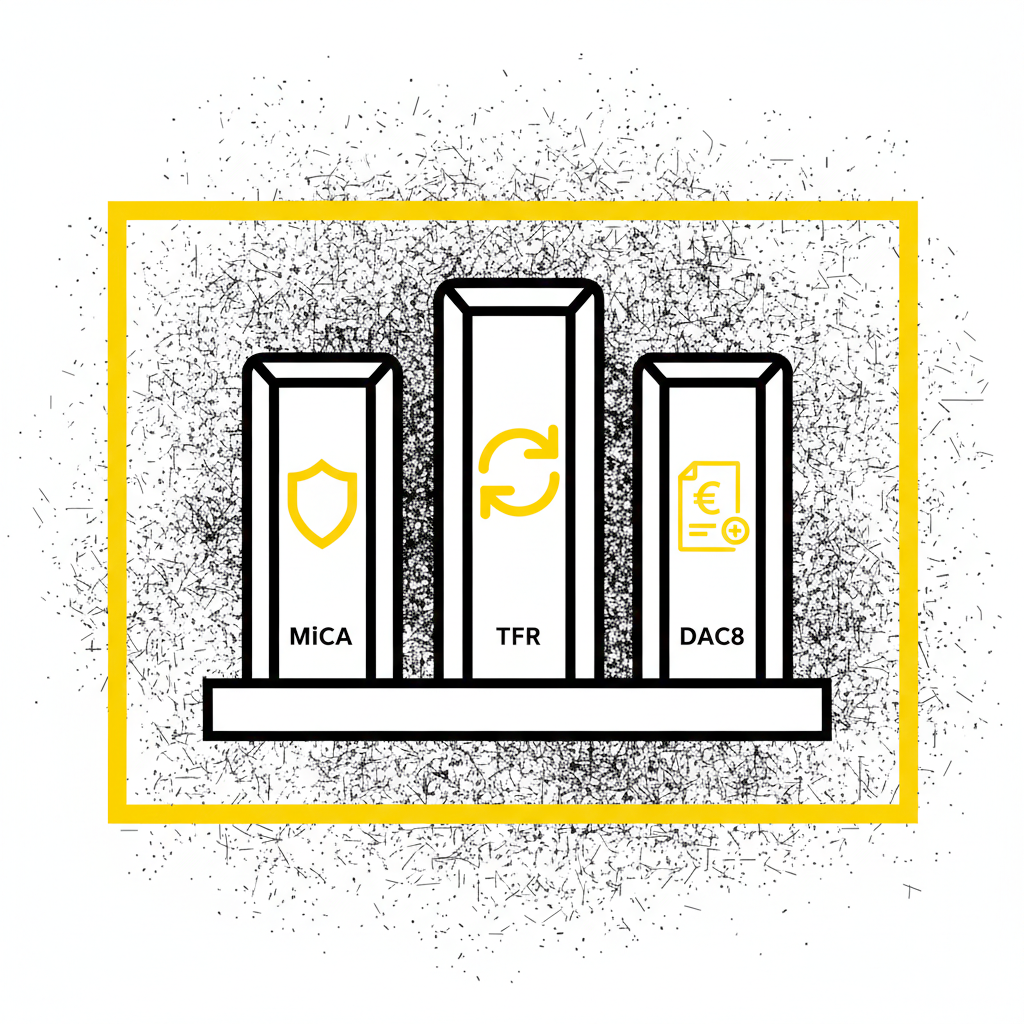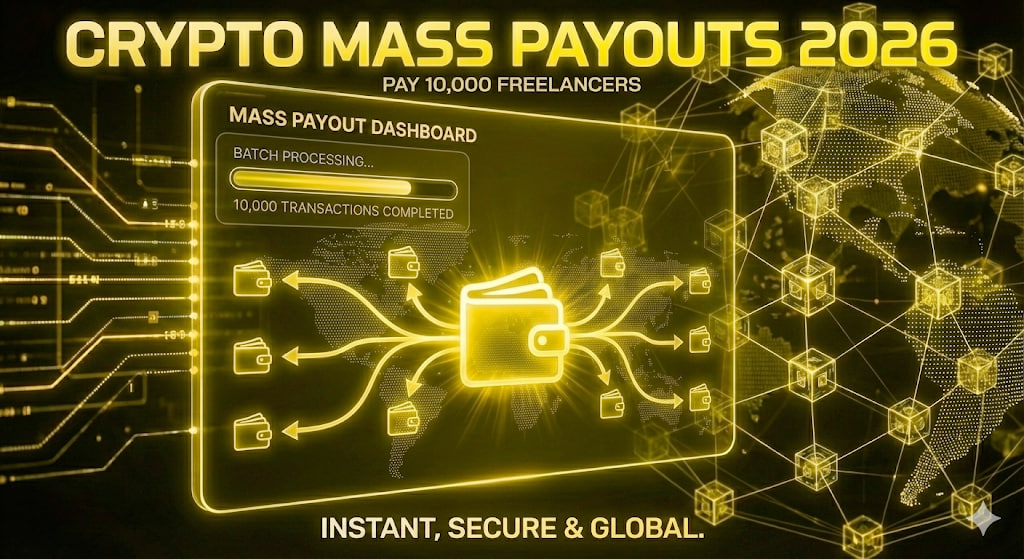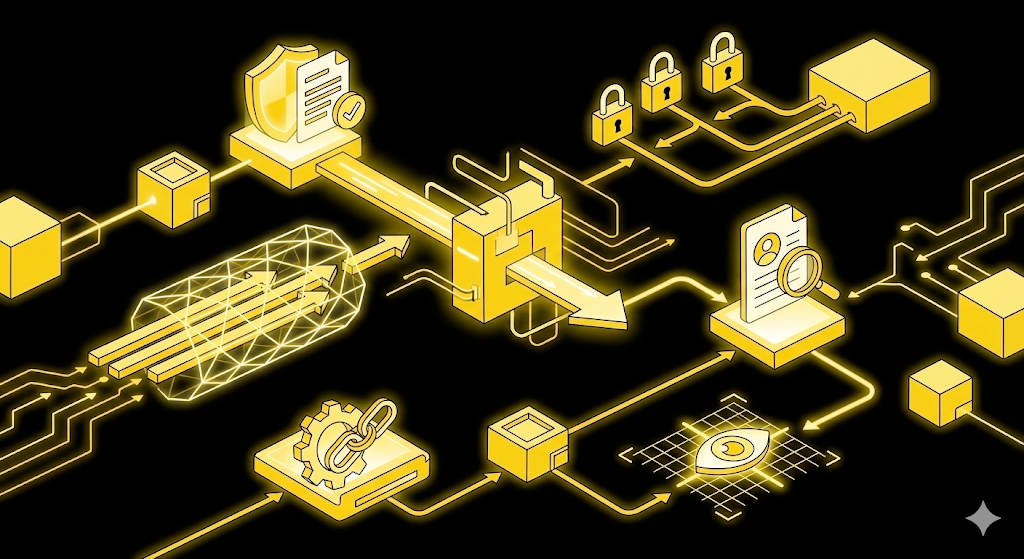- Home
- /
- Blog
Blog
In this dedicated blog page, we invite you to explore a wealth of knowledge, expertise, and inspiration that transcends traditional boundaries.

How to Integrate Crypto Payments into Your Business: A Practical Guide
Adding a crypto payment gateway to your business can open new doors. It lets you accept crypto payments from customers worldwide, bringing faster transactions, lower fees, and no chargebacks. But it’s not as simple as flipping a switch. To truly make crypto work for your business, there’s a list of things you need to get right.
Adding a crypto payment gateway to your business can open new doors. It lets you accept crypto payments from customers worldwide, bringing faster transactions, lower fees, and no chargebacks. But it’s not as simple as flipping a switch. To truly make crypto work for your business, there’s a list of things you need to get right.
Set Up a Digital Wallet
A wallet is where digital assets are stored. For daily operations, software wallets can be enough. But for larger amounts, businesses usually choose hardware wallets for added security.
Choose and Integrate a Payment Solution
You'll need a payment gateway that supports digital currencies. This might be a plugin for your e-commerce platform or a custom API integration. The goal is to make payment easy for customers and seamless for your team.
Handle Pricing and Exchange Rates
Decide how to display prices-directly in digital currency or by converting from your local currency at the moment of purchase. Make sure exchange rates are transparent for your customers.
Manage Volatility
Digital currencies are known for price swings. Have a strategy for dealing with this, such as converting to stablecoins or fiat currency immediately after payment.
Monitor Transaction Fees
Network fees can change depending on demand. Regularly review these costs to ensure they remain acceptable for your business.
Stay Compliant
Digital payments are subject to different rules in different regions. Make sure you understand your obligations around KYC (Know Your Customer), AML (Anti-Money Laundering), and other regulatory requirements.
Educate Your Team
Everyone involved should know how the system works-especially your customer service team, who may need to help customers with payment questions.
Communicate with Customers
Let your customers know that you now accept digital payments. Add clear messaging across your website, marketing materials, and checkout flow.
Test Before Launching
Run test payments to ensure the process is smooth from start to finish. This helps catch any issues before customers experience them.
Strengthen Security
Security is a top priority. Use strong authentication, multi-signature wallets, and cold storage for long-term holdings. Keep your security protocols updated.
Set Up Accounting Processes
Track every transaction carefully. Many tax authorities require detailed reporting of digital currency transactions, and having a solid system in place is essential.
Prepare Customer Support
Expect questions and occasional payment issues. Make it easy for customers to contact you and resolve problems quickly.
Stay Informed
The digital payments landscape evolves rapidly. Keep an eye on regulatory changes, new technologies, and market trends to stay ahead.
Get Tax Advice
Digital currency can create tax liabilities. Consult a tax advisor who understands how digital payments are handled in your jurisdiction.
Review and Optimize
Regularly review how digital payments are working for your business. Gather customer feedback and monitor performance to make improvements as needed.
How INXY Payments Supports These Steps
At INXY Payments, we've built our platform to address all these challenges in one place. Our service is designed for businesses that want to add digital currency payments with minimal friction and maximum compliance. Here's how we help:
- Auto-conversion: Incoming payments can be automatically converted to stablecoins or fiat currency to minimize volatility.
- Full Compliance: Our platform is fully compliant with MiCA and other EU regulations, with built-in tools for KYC and AML checks.
- Seamless Integration: Whether you use the API or our dashboard, setup is simple and fast.
- No Wallet Management: You don't need to create and maintain wallets on different blockchains or hold extra coins to pay network fees-we handle that for you.
- Custom Reports: We provide detailed, customized reports to simplify your accounting and tax filing.
- Security First: Advanced security features protect your funds at every step.
- Global Reach: We support payments worldwide and work across multiple industries.
- Expert Support: Our team offers personalized onboarding and ongoing assistance, including tax consultations and compliance help.
- Always Up-to-Date: We stay on top of blockchain updates and new infrastructure developments, so you don't have to worry about keeping up with tech changes.
Whether you want to accept bitcoin payments, send mass payouts in crypto, or add a seamless crypto billing option to your service, we've got you covered.
Articles

How to Verify a Merchant Account? Step-by-Step Guide
Navigating the regulatory landscape of 2026 is crucial for any business accepting digital assets. This guide provides a comprehensive, step-by-step walkthrough of the merchant verification process for crypto payment gateways in the European Union. From understanding the Markets in Crypto-Assets (MiCA) regulation to mastering the Know Your Business (KYB) documentation requirements, we detail exactly how to secure a verified, bank-grade account. Whether you are in e-commerce, hosting, or high-risk industries, this unified framework ensures your business is compliant, secure, and ready for the global economy.
How to Verify a Merchant Account? Step-by-Step Guide
The institutionalization of the digital asset economy within the European Union has reached a definitive stage. As the financial sector navigates the complexities of the mid-2020s, regulatory compliance and operational excellence are no longer optional for businesses seeking to leverage blockchain-based financial rails.

For crypto payment gateways based in the EU, such as INXY Payments, the verification workflow represents the first and most critical touchpoint in establishing a secure, bank-grade relationship with professional partners. This report provides an exhaustive analysis of the merchant verification process, grounded in the primary directives of the Markets in Crypto-Assets (MiCA) Regulation and the practical requirements of the Know Your Business (KYB) standards.
The Regulatory Landscape: MiCA, TFR, and DAC8
The "Regulatory Rubicon" has been crossed, shifting the focus of European authorities from drafting policy to aggressive enforcement. Central to this environment is the Markets in Crypto-Assets Regulation (MiCA), which has successfully harmonized the rules for digital assets across all 27 EU member states.
The verification process is now governed by three key frameworks:
- MiCA Authorization: Eliminates the "Wild West" era, ensuring only fully authorized providers operate within the EEA.
- Transfer of Funds Regulation (TFR): Enforces a "Zero Threshold" policy for the "Travel Rule," requiring detailed data on the originator and beneficiary for every transaction.
- DAC8: Mandates strict tax reporting and the collection of Tax Identification Numbers (TINs) to ensure fiscal transparency.

Architecture of the Know Your Business (KYB) Process
Know Your Business (KYB) is the primary defensive mechanism used by fintech gateways. Unlike Know Your Customer (KYC), which focuses on individuals, KYB requires a deeper exploration of corporate hierarchies.
The Verification Objectives:
- Legal Existence: Proving the business is a real, registered entity.
- Control Disclosure: Identifying the Ultimate Beneficial Owners (UBOs) to prevent the use of shell companies for illicit activities.
- Risk Scoring: Evaluating the industry, geography, and transaction profile of the merchant.
The INXY Payments Verification Workflow: A Step-by-Step Guide
The verification process is designed to be rigorous yet streamlined, ensuring all participants meet EU compliance standards. This is a unified process applicable to all merchants, regardless of their industry or integration method.
Step 1: Initial Company Data Intake
The process commences with the "Company data form." The merchant must enter fundamental identifying information, including the legal Company Name, official Registration Number, and Country of Registration.
Note: Providing a direct company email is recommended to ensure a clear line of communication with compliance officers.
Step 2: Comprehensive Documentation Upload
Merchants must validate their legal status by uploading a robust evidentiary file. Mandatory documents typically include:
- Certificate of Incorporation / Business Registration: Proof that the entity exists in a government registry.
- Articles of Association (AOA): Defines the entity's operations and leadership structure.
- Operating License: Required only if the merchant operates in a specifically regulated sector (e.g., gambling, forex).
Step 3: Ultimate Beneficial Owner (UBO) Identification
Identifying the natural persons who ultimately control the entity is the cornerstone of EU AML regulations.
- The 25% Rule: Merchants must identify any natural person holding more than 25% of ownership shares or voting rights.
- Verification: For each UBO, the system requires their full name, date of birth, and contact details. Identity verification can be performed live or via a secure link sent to the stakeholder.
Step 4: Shareholder and Representative Verification
- Corporate Shareholders: If a shareholder is another company, the merchant must provide that entity's Articles of Association and trace the ownership chain back to a natural person.
- Legal Representative: Data must be provided for the person acting on behalf of the company, ensuring they have the legal authority (e.g., Director status or Power of Attorney) to open financial accounts.
Step 5: Final Validation and Submission
The penultimate step is a thorough review of all provided data. Once confirmed, the application enters the compliance review queue. Thanks to automated systems, merchants can track their status in real-time via their dashboard.

Document Requirements and Authentication Standards
The integrity of the verification process relies entirely on the quality of the documentation. The European fintech environment maintains a high bar for validity.
Mandatory Conditions for Approval:
- Language: All documents must be in English. If the original is in another language, a notarized translation is required.
- Authentication: Documents must be "official," bearing the necessary stamps, signatures, or qualified electronic seals as per local laws.
- Recency: Extracts from commercial registries generally should not be older than 3 months to ensure the data is current.
Common Reasons for Rejection:
- Typos: Mismatches between the input form and the uploaded PDF.
- Missing Pages: Uploading incomplete Articles of Association.
- Low Quality: Blurry scans or photos where text is illegible.
Security and Data Protection (GDPR & DORA)
The sensitive nature of KYB data requires the highest levels of protection.
- GDPR Compliance: Data is used solely for client identification and activity justification, adhering to the principle of "Purpose Limitation."
- DORA (Digital Operational Resilience Act): Mandates that payment gateways demonstrate resilience against cyber threats. Data is encrypted at rest and in transit, with role-based access ensuring only authorized compliance personnel can view identity files.

Conclusion: Compliance as a Competitive Advantage
Completing the merchant verification process is more than a regulatory hurdle; it is a strategic move that positions a business as a credible player in the global economy. By adhering to this standardized verification workflow, merchants—whether they are hosting providers, e-commerce stores, or digital service agencies—secure a stable, bank-grade foundation for their financial operations.
In the mature crypto economy of 2026, a verified account is the key to unlocking global markets, ensuring seamless settlements, and protecting business capital from regulatory friction.

Accept Crypto Payments on WHMCS
Gemini said Here is a concise blog summary optimized for readability and engagement, designed to pull readers into the full guide. Blog Summary: Integrating Crypto via INXY for WHMCS In 2026, cryptocurrency has moved beyond speculation to become a primary "production" currency for global digital services. For hosting providers and agencies using WHMCS, the shift toward stablecoins—the "Internet’s dollar"—is a critical competitive advantage. This guide explores how to integrate the INXY Payment Gateway, a robust solution designed to bridge the gap between traditional billing and the modern crypto economy.
In 2026, the fintech landscape is shifting from speculation to production. For hosting providers, VPN services, and digital agencies using WHMCS, the question is no longer if you should accept cryptocurrency, but how efficiently you can do it. With stablecoins becoming the "Internet’s dollar" for cross-border flows, integrating a robust payment gateway is essential for maintaining a competitive edge in the EU and global markets.
One of the most seamless ways to bridge the gap between traditional billing and the crypto economy is through the INXY Payment Gateway. This guide provides a detailed walkthrough for setting up the INXY module on your WHMCS platform.
1. Why Crypto for WHMCS in 2026?
Integrating crypto payments into your billing system offers several strategic advantages:
- Lower Fees: Traditional processors often charge 2–4% for international payments, while gateways like INXY provide more cost-effective alternatives.
- Chargeback Protection: Blockchain transactions are immutable; once confirmed, they cannot be reversed by the sender, eliminating the administrative burden of fraudulent chargebacks.
- Global Reach: Crypto allows you to accept payments from customers in regions with restrictive banking or unstable local currencies without multi-day delays.

2. System Requirements
Before installation, ensure your environment meets the following criteria for the INXY module (Version 1.0.3):
- WHMCS Version: 8.0 up to 8.13.1.
- PHP Version: 7.4 or higher with ionCube Loader.
- Merchant Account: A valid account on the INXY platform.
- Security: An SSL certificate is recommended to ensure secure webhook notifications.
3. Step-by-Step Installation
Step 1: Download the Module
Download the official module archive from the INXY distribution folder.
Step 2: Upload Files
Using FTP or your hosting file manager, upload the files to your WHMCS directory following this structure:
- /modules/gateways/inxy.php
- /modules/gateways/inxy/ (including assets, pages, and config files)
- /modules/gateways/callback/inxy.php
Step 3: Activation
- Log in to your WHMCS Admin Panel.
- Go to Apps & Integrations and find the INXY Payment Gateway.
- Click Activate.
4. Configuration and API Setup
Navigate to System Settings → Payment Gateways → INXY Payment Gateway to finalize your settings:
Field
Description
Display Name
What customers see at checkout (e.g., "Pay with Crypto").
API & Secret Key
Found in your INXY Dashboard.
Convert To
Select USD or EUR for processing fiat invoices.
Test Mode
Enable this to use the Sandbox environment for testing.
Setting Up Webhooks
To ensure your invoices are marked as paid automatically, you must configure the Postback URL in your INXY Merchant Dashboard:
- URL Format: https://yourdomain.com/modules/gateways/callback/inxy.php
- Location: Go to Merchant settings → API in the INXY dashboard and paste the URL.

5. Advanced Matching and Underpayment Rules
Crypto transactions can sometimes result in minor amount differences due to network fees. INXY handles this through the config.php file:
- Amount Deviation: By default, the module accepts payments within 1% of the requested amount. For WHMCS, it is recommended to set 'amount_deviation_percentage' = 49 to reduce unnecessary top-up attempts and align with WHMCS's partial payment flow.
- Time Window: Payments must arrive within 2 hours in production (30 minutes in Sandbox) to be automatically matched.

6. Summary of Payment Outcomes
Status
Customer Experience
WHMCS Admin Status
Paid in Full
Invoice shows "Paid".
Order marked as paid.
Overpaid
Extra amount added as credit.
Visible credit in account.
Partially Paid
"Awaiting payment" status.
Balance reduced by amount received.
Expired
"Expired" status on page.
Order remains unpaid.
By implementing INXY, you provide your users with a modern, 24/7 payment rail that settles in seconds, ensuring your hosting or digital business stays ahead of the curve in 2026.
Would you like me to draft a series of social media posts to announce your new crypto payment options to your customers?

How to Integrate a Crypto Payment API: A Developer’s Guide for 2026
Integrating crypto payments is no longer just about generating a wallet address—it’s about building a robust, scalable financial pipeline. In this 2026 Developer’s Guide, we strip away the complexity of blockchain interactions and provide a clear roadmap for API integration.
How to Integrate a Crypto Payment API: A Developer’s Guide for 2026
In the fast-moving world of fintech, the question is no longer if a business should accept cryptocurrency, but how seamlessly it can be integrated. As we move through 2026, the European market has reached a point of high maturity. With the full enforcement of MiCA (Markets in Crypto-Assets) regulations, crypto payments have transitioned from a niche experiment to a standardized financial tool for EU-based enterprises.
For developers and product managers, integrating a crypto payment API is now as streamlined as traditional fiat gateways, provided you follow the right architectural patterns.
1. Understanding the 2026 Integration Workflow
Modern crypto integration follows a predictable RESTful pattern. Unlike the early days of manual wallet monitoring, today’s gateways handle the blockchain's complexity, allowing your backend to interact with simple JSON payloads.
The standard lifecycle of a crypto payment includes:
- Initialization: Your server requests a unique payment address for a specific order.
- Monitoring: The gateway monitors the blockchain (Bitcoin, Ethereum, Tron, etc.) for incoming transactions.
- Confirmation: The gateway verifies the transaction depth (number of block confirmations).
- Webhook Notification: Your system receives an asynchronous callback to update the order status.

2. Step-by-Step API Integration
Phase A: Environment Setup
Before hitting production, high-quality gateways provide a Sandbox environment. This allows you to simulate successful payments, timeouts, and underpayments without risking real capital. You’ll typically need two headers for every request:
- X-API-KEY: Your unique identifier.
- X-PAY-SIGNATURE: A HMAC-SHA512 hash to ensure data integrity.
Phase B: Creating the Payment
To start a checkout, your backend sends a POST request to the /invoices or /payments endpoint.
JSON
{
"amount": 150.00,
"currency": "EUR",
"order_id": "ORDER-9921",
"callback_url": "https://yourstore.com/api/webhooks/crypto"
}
The gateway responds with a destination address and a QR code URL. In 2026, the best UX practice is to offer "Invisible Crypto"—where the user sees a familiar interface, and the gateway handles the real-time conversion behind the scenes.
Phase C: Handling the Webhook
This is the most critical part of the integration. Since blockchain transactions are asynchronous, your server must be ready to receive a POST callback.
Pro Tip: Always verify the webhook signature. Never update an order status based solely on the incoming payload without checking that the request actually originated from your provider.
3. Security and Compliance in the EU
In the 2026 fintech landscape, security isn't just about encryption; it's about regulatory alignment. Within the EU, businesses must ensure their payment partner adheres to Transfer of Funds Regulation (TFR) and AML (Anti-Money Laundering) standards.
When choosing a provider, look for features like:
- Auto-Conversion: Instantly swapping volatile assets into stablecoins or EUR to protect your margins.
- Audit-Ready Reporting: Financial statements that your accounting team can actually use for VAT and tax filings.
This is where specialized gateways like INXY (inxy.io) excel. Built specifically for the EU market, INXY acts as a regulated bridge. It doesn't just provide an API; it provides a compliant infrastructure that allows Web2 companies to scale into Web3 without the headache of managing private keys or worrying about crypto volatility. By integrating a solution like INXY, businesses can reduce processing fees by up to 70% compared to traditional card networks, while benefiting from instant SEPA settlements.

4. Testing and Optimization
Before going live, run "Chaos Tests" on your integration. What happens if a user sends too little? What if they pay after the 20-minute price-lock window? A robust API should provide clear error codes for these scenarios, allowing your frontend to guide the user toward a resolution—such as a partial refund or a top-up payment.
Conclusion
Integrating a crypto payment API in 2026 is a strategic move that opens your business to a global, tech-savvy audience. By utilizing professional gateways that handle the heavy lifting of compliance and conversion, your team can focus on what matters: the product.
Ready to modernize your payment stack? Would you like me to draft a technical checklist for your dev team to use during the INXY sandbox testing phase?

Crypto Payment Gateway vs. Processor: What’s the Difference?
While the terms are often used interchangeably, choosing between a Crypto Payment Gateway and a Crypto Processor can fundamentally change how your business handles digital assets. One acts as the technical bridge, while the other serves as a comprehensive financial engine.
If you’ve spent any time navigating the fintech landscape in 2026, you’ve likely noticed that "crypto payment gateway" and "crypto payment processor" are thrown around like synonyms. In casual conversation, that’s fine. But if you’re a business owner in the EU trying to optimize your checkout or manage a complex treasury, the distinction matters. It’s the difference between a sleek front-end interface and the heavy-duty engine room that actually moves the money.
Let’s break down the technicalities of these two components and see how they work together to modernize your business.
The Crypto Payment Gateway: Your Digital Storefront

Think of the Crypto Payment Gateway as the "front-end" layer. It is the bridge between your website and the blockchain. Its primary job is to handle the customer-facing part of the transaction.
When a customer clicks "Pay with Crypto," the gateway jumps into action:
- Checkout UI: It displays the QR code or wallet address.
- Real-time Rate Locking: It calculates the exact exchange rate between, say, Bitcoin and the Euro, and freezes it for a few minutes so the customer knows exactly what they’re paying.
- Data Transmission: It securely passes the transaction details to the processor.
Essentially, the gateway is the digital equivalent of a Point-of-Sale (POS) terminal. It’s all about user experience and making sure the "handshake" between the customer and the merchant is secure and seamless.
The Crypto Payment Processor: The Engine Room

While the gateway handles the "hello," the Crypto Payment Processor handles the "settlement." This is the back-end infrastructure that manages the lifecycle of the funds after the customer hits send.
The processor’s responsibilities are significantly broader:
- Blockchain Validation: It monitors the network to confirm the transaction has reached the required number of blocks.
- Settlement & Conversion: This is the big one. If you invoiced for €1,000 but the customer paid in Bitcoin, the processor handles the conversion and ensures those funds are ready for your bank account.
- Compliance (KYC/AML): It runs the necessary checks to ensure the transaction isn't linked to illicit activity—a non-negotiable for EU-based businesses under current regulations.
- Payouts: It manages the transfer of funds from the crypto ecosystem into your corporate SEPA or SWIFT account.
Comparison at a Glance
Feature
Crypto Payment Gateway
Crypto Payment Processor
Primary Role
Front-end UI / Communication
Back-end settlement / Logistics
Focus
User Experience (UX)
Compliance & Fund Movement
Key Output
QR Codes, API Callbacks
Fiat Payouts, Tax Reporting
Analogy
The Card Reader on the counter
The Bank/Clearing House
Why the Distinction Matters for EU Businesses
In the European fintech market, precision is everything. If you only use a "gateway" without a robust processing layer, you might find yourself with a wallet full of crypto but no easy way to pay your local taxes or suppliers in fiat.
Conversely, a processor without a good gateway might provide great liquidity, but your customers will struggle with a clunky, manual checkout process that kills your conversion rate.
This is where integrated solutions come in. Platforms like INXY bridge this gap by functioning as a unified ecosystem. By combining an EU-licensed gateway (the part your customers see) with a powerful processing engine (the part your accountant loves), it removes the friction of managing two separate services.
Why "All-in-One" is the 2026 Standard
Modern fintech has moved past fragmented tools. For instance, INXY Payments focuses heavily on high-conversion gateways specifically for e-commerce, infrastructure and hosting providers. Because they operate as an EU-authorized VASP (Virtual Asset Service Provider), the processing side is built-in.
For a merchant, this means:
- Zero Volatility: The rate is locked at the gateway level and settled instantly at the processor level.
- Mass Payouts: You can collect payments via the gateway and immediately use those funds to pay global affiliates or remote teams via the processor’s API.
- Legal Clarity: Since the processor handles the KYB (Know Your Business) and AML checks, the funds landing in your bank account are "clean" and fully documented for tax purposes.
Summary
A gateway gets you paid; a processor keeps you in business. While they serve different technical functions, the most successful companies in 2026 are those that don’t make their customers (or their dev teams) choose between the two.
By using an integrated platform like INXY, you get the best of both worlds: a checkout experience that converts and a back-end that settles without the headaches of traditional banking delays.

Best Crypto Exchanges 2026
Choosing the best crypto exchange in 2026 depends on fees, transaction speed, security, and overall user experience. This guide compares leading crypto exchanges, highlights platforms with low fees and fast performance, and explains what to look for to trade safely and efficiently in a rapidly evolving market.
Introduction to Crypto Exchanges
Crypto exchanges are platforms where you can buy, sell, or trade cryptocurrencies. Imagine them like a stock market but for digital coins. They let you swap your Bitcoin for Ethereum or convert your dollars into a stablecoin.
These exchanges come in two main types: centralized and decentralized. Centralized ones, like Binance, have a company behind them that manages everything. They often offer better security and customer service. Decentralized exchanges, or DEXs, let you trade directly with others, giving you more control over your assets.
When choosing an exchange, look for low commission fees and fast transaction speed. Some platforms set withdrawal limits, so check those if you plan on moving large amounts. Mass payouts are a feature to seek if you need to distribute funds to many users. Each exchange has its pros and cons, so consider what's important to you before diving in.
Criteria for Selection
Choosing the best crypto exchange in 2026 isn't a walk in the park. It's all about weighing different aspects. First, let's talk about fees. Lower fees mean you keep more of your money. Some exchanges offer low commission rates, making them attractive to traders who buy and sell often.
Next up is transaction speed. Fast transaction times allow you to buy or sell quickly, which is crucial in the fast-moving world of crypto. Nobody wants to wait around while prices are changing.
Security is a big deal too. With the rise in cyber threats, knowing your money is safe is essential. Exchanges that invest in top-notch security measures, like two-factor authentication and cold storage, stand out.
Consider withdrawal limits as well. High limits mean you can access your funds whenever you want. It's important for those who deal with large amounts of cryptocurrency.
Mass payouts are another factor. If you're involved in crypto mining or other activities that require frequent payouts, you'll want an exchange that handles mass payouts efficiently.
Stablecoin availability is something to think about. Exchanges that support various stablecoins can provide more options for trading or holding value.
Each of these criteria plays a role in finding the best exchange. Balancing them based on your needs will help you make the right choice.

Top Crypto Exchanges for Low Fees
When it comes to buying and selling crypto, fees can really add up. That's why it's key to choose a cryptocurrency exchange that offers low fees. Some exchanges charge a flat fee for every trade, while others use a percentage of the trade amount. For instance, if you trade a large amount, a percentage fee might cost you more.
Binance and Kraken are often praised for their low fees. Binance, for example, charges a very small percentage for each trade. This can save you a lot over time, especially if you're trading frequently. Kraken also offers competitive fees, making it a favorite for many traders.
Another option to consider is using a stablecoin. Some exchanges offer discounts or lower fees when you trade with stablecoins. This can be a smart way to keep costs down. It's important to check each exchange's fee schedule before you start trading. This way, you won't get any nasty surprises down the road. Choosing the right exchange can help you maximize your investment without losing too much to fees.

Fastest Crypto Exchanges
When you're dealing with cryptocurrency, every second counts. Transaction speed is a big deal in the crypto world. It's all about how fast you can buy, sell, or transfer your digital coins. Some exchanges stand out because they let you do this super quickly. Let's dive into what makes these exchanges tick.
First off, why does speed matter? Imagine you're at a store, and you want to buy something. You hand over your money, but the cashier takes forever to process it. Frustrating, right? The same goes for crypto exchanges. A fast exchange means you can make trades when the market is right for you. It's like being the first in line for a new gadget release.
So, what makes an exchange fast? It's a mix of technology and strategy. These exchanges use cutting-edge servers and networks. They're always upgrading to handle more transactions at once. Think of it like a highway. More lanes and fewer traffic lights mean you get to your destination faster.
One example of a speedy exchange is Binance. Known for its lightning-fast transactions, Binance uses technology that can process over a million orders per second. This means you rarely have to wait to complete a trade. KuCoin is another name that pops up when we talk speed. They have a reputation for quick order processing, ensuring users can jump on market opportunities without delay.
But speed isn't just about the tech. It's also about the user experience. Fast exchanges have simple and intuitive interfaces. This means you spend less time figuring out how to make a trade and more time actually trading. It's like shopping online with a website that's easy to navigate.
However, don't forget about security. A fast exchange is great, but it must also be safe. The best exchanges balance speed with security measures to protect your money and information. After all, no one wants a fast transaction if it puts their assets at risk.
In 2026, the fastest exchanges will likely combine advanced technology with user-friendly designs. They'll cater to both beginners and experts, ensuring everyone can trade quickly and securely. As the crypto world evolves, speed will remain a key factor in choosing the right exchange for you.

Security Features of Leading Exchanges
When we talk about crypto exchanges, security is a big deal. In 2026, exchanges are stepping up their game to keep your digital assets safe. They use several strong security features, and here’s a look at some of them.
One of the main features is two-factor authentication (2FA). This adds an extra layer of protection by requiring not just a password but also a code sent to your phone. So, even if someone gets your password, they can't access your account without your phone.
Another key feature is cold storage. This means keeping most of the cryptocurrency offline, away from potential hackers. Cold storage is like a vault for your digital coins, making it much harder for online thieves to get to them.
Exchanges also use encryption to protect data. This scrambles information so that it can only be read by someone with the right key. It keeps your personal and financial details secure from prying eyes.
Some exchanges go even further by offering insurance to cover potential losses. This means if there’s a security breach, you might get compensated. It’s like having a safety net for your investments.
Regular audits are also part of the security measures. These audits check the exchange's systems for vulnerabilities. It's a way to catch and fix problems before they can be exploited by hackers.
Look out for exchanges that have a strong track record of keeping user funds secure. They often have security teams working around the clock to monitor for suspicious activity. These teams are crucial in preventing attacks and responding quickly if something goes wrong.
In 2026, exchanges are more prepared than ever to protect your assets. By using advanced security features, they aim to provide a safe environment for trading and investing in cryptocurrencies.
User Experience and Support
When choosing a crypto exchange, user experience is key. A well-designed platform helps users find what they need quickly. Imagine trying to trade in a cluttered market; it's confusing and stressful. Similarly, a clean and intuitive interface makes trading smoother. Many top exchanges offer easy navigation with clear labels. Even beginners can understand where to click and what to do next.
Support is another crucial factor. In the crypto world, issues can arise anytime, and quick help is often needed. Good exchanges offer 24/7 customer support, ready to assist whether it's a technical glitch or a simple question. Some exchanges even provide live chat, where you can get instant answers instead of waiting for an email reply.
Let's talk about mobile apps. Many users trade on the go, using phones or tablets. A good mobile app mirrors the desktop experience. It should be fast, not freeze, and support all functions, like buying, selling, or checking balances. Imagine being able to trade while waiting for a bus or during a lunch break.
Feedback from other users is valuable. Reviews and ratings give insights into what an exchange does well and where it might lack. If many users mention slow response times from support, it might be a red flag. On the other hand, praise for quick help boosts confidence in the platform.
Language support is also important. Crypto is global, and exchanges should support multiple languages. This makes it easier for non-English speakers to navigate and understand the platform. A user-friendly exchange speaks the user's language, not just literally but also figuratively, by making every step clear and simple.
Conclusion: Choosing the Right Exchange
Picking the right crypto exchange can feel like choosing the right tool for a job. Different exchanges offer different features, so it's crucial to know what you need. Let's break down the key factors to help you make an informed choice.
First, think about fees. Some exchanges charge high fees for transactions, which can eat into your profits. Look for exchanges with low commission rates. This is especially important if you plan to trade frequently. Compare the fee structures of various exchanges to find the most cost-effective option.
Next, consider transaction speed. If you're looking to make quick trades, an exchange with fast transaction processing is essential. Slow transaction speeds can lead to missed opportunities, especially in the fast-paced crypto market. Check user reviews or test the platform yourself to see how quickly it processes transactions.
Security is another critical factor. An exchange must have robust security measures to protect your funds. Look for exchanges that offer two-factor authentication and cold storage options. These features help safeguard your assets against hacks and breaches.
Withdrawal limits are also important. Some exchanges have strict limits on how much you can withdraw at one time. If you plan to move large amounts of crypto, ensure the exchange allows for mass payouts. Check the withdrawal policies of each exchange to avoid unexpected restrictions later.
Stablecoins can offer stability in a volatile market. If you want to minimize risk, consider an exchange that supports a wide range of stablecoins. Stablecoins retain their value better than other cryptocurrencies, making them a safer choice during market fluctuations.
Finally, think about user experience. A user-friendly interface can make trading smoother and less stressful. Look for exchanges with intuitive designs and helpful customer support. This can make a big difference, especially if you're new to cryptocurrency trading.
By focusing on these factors—fees, speed, security, withdrawal limits, stablecoins, and user experience—you can find a crypto exchange that meets your needs. Make sure to research thoroughly before making your choice. Each factor plays a part in ensuring a positive trading experience.
FAQ
What are crypto exchanges, and why are they important?
Crypto exchanges are platforms that facilitate the buying, selling, and trading of cryptocurrencies. They are crucial for the cryptocurrency ecosystem as they provide the necessary infrastructure for market liquidity and price discovery.
What factors should I consider when choosing a crypto exchange in 2026?
Key factors to consider include the exchange's fee structure, transaction speed, security measures, user experience, and customer support. These elements determine the overall efficiency and safety of your trading experience.
Which crypto exchanges are known for having the lowest fees?
Exchanges that offer low commission rates and competitive pricing are highlighted in the 'Top Crypto Exchanges for Low Fees' section. These platforms provide cost-effective trading solutions and are ideal for frequent traders.
What makes an exchange fast, and why is speed important?
An exchange's speed is determined by the efficiency of its transaction processing system. Fast exchanges enable quick buying and selling of cryptocurrencies, which is essential for taking advantage of market opportunities and minimizing slippage.
How do top exchanges ensure the security of user funds and data?
Leading exchanges implement advanced security measures such as two-factor authentication, encryption protocols, cold storage for assets, and regular security audits to safeguard user funds and sensitive information.
How can I evaluate the user experience and support of a crypto exchange?
Assess the platform's user interface for ease of navigation and accessibility. In addition, consider the quality and availability of customer support services, including responsiveness and the range of support channels offered.
What are some tips for choosing the right crypto exchange for my needs?
Consider your trading priorities, such as cost, speed, and security. Evaluate the exchange's reputation and reviews, and ensure it supports the cryptocurrencies you wish to trade. Tailor your choice based on your individual needs and trading strategy.

Crypto Mass Payouts 2026: Pay 10,000 Freelancers
Crypto mass payouts in 2026 enable businesses to pay thousands of freelancers quickly and globally using stablecoins and automated blockchain infrastructure. This article explains how modern payout platforms abstract network complexity, handle compliance and accounting, and turn large-scale crypto payouts into a reliable, repeatable payment process.
Understanding Crypto Mass Payouts
Crypto mass payouts sound like a big, fancy term, but the basic idea is simple. Imagine you have a large list of freelancers, say 10,000, and you need to pay them. Doing this one by one would take a huge amount of time. That’s where crypto mass payouts come in. They allow businesses to send payments to a large group at once, instead of processing thousands of individual transfers.
At a high level, the process relies on blockchain technology. Blockchains like Bitcoin, Ethereum, TRON, and others act as shared public ledgers. Every transaction is recorded and can be verified, which makes the system transparent and hard to manipulate. This is one of the reasons crypto payments are trusted for global payouts.
However, while the concept of mass payouts is straightforward, execution becomes much more complex as volume grows. Paying 10 freelancers is one thing. Paying 10,000 introduces operational challenges that are easy to underestimate at first.
For businesses, crypto mass payouts can save time and reduce fees compared to traditional bank transfers, especially for international payments. A freelancer in another country might receive funds in minutes instead of waiting days for a wire transfer. Stablecoins like USDT and USDC are commonly used because they are tied to the US dollar, which helps avoid sharp price swings.
At the same time, real-world payout operations involve much more than just “sending crypto.” Network fees, compliance checks, reconciliation, and reporting all become part of the picture.

The Rise of Freelancing in 2026
Freelancing has taken the world by storm in 2026. What used to be a niche career path is now a mainstream way of working. More professionals are choosing flexible, remote work, and companies are increasingly comfortable hiring freelancers across borders.
Technology has played a major role in this shift. Platforms that connect freelancers with clients have matured, and global collaboration tools are now standard. Payment systems have also evolved, making it easier to send money across countries.
As freelancer volumes increase, payments turn into a scaling challenge. A system that works well for a few dozen payouts often breaks down when a company needs to pay hundreds or thousands of people on a regular basis. Delays, errors, or failed payments quickly impact trust and retention.
This is one reason why crypto and stablecoin payouts have gained traction. They offer speed and global reach, but only when supported by the right infrastructure.
Choosing the Right Crypto for Payouts
When deciding which cryptocurrency to use for mass payouts, several factors matter. Speed and transaction fees are important, which is why stablecoins such as USDT and USDC are popular choices. Their value remains relatively stable, making them suitable for salary-like payments.
Security and reliability are also critical. Businesses typically prefer assets and networks with a strong track record and wide adoption.
An often-overlooked factor is the blockchain network itself. USDT on TRON, USDT on Ethereum, and USDT on other networks may share the same name, but operationally they behave very differently. Each network has its own fee structure, speed, and technical requirements. Choosing the wrong network or mixing them up can lead to failed or lost payments.
As payout volumes grow, these differences become more important, not less.
Tech Solutions for Fast Payouts
In the fast-paced world of freelancing, getting paid quickly is a top priority. Blockchain technology makes this possible by allowing transactions to be processed directly between parties, without traditional banking intermediaries. This often results in faster settlement and lower fees.
Smart contracts can add another layer of automation by executing payments when predefined conditions are met. Crypto wallets store assets like USDT and USDC and allow recipients to receive funds from anywhere in the world.
That said, these tools alone are not enough for large-scale payouts. Wallets and smart contracts do not automatically handle gas fees, currency conversion, compliance checks, or accounting. Without additional systems, finance teams still end up doing a lot of manual work.
This is why modern payout platforms focus on orchestration rather than just transactions.

Step-by-Step Process for Mass Payouts
When companies first explore crypto mass payouts, they often follow a simple process. They collect wallet addresses from freelancers, prepare a payout list, and upload it as a CSV file to a payout tool. After reviewing the data, they initiate the transfer and notify recipients.
While this approach may work for small batches, it becomes risky and inefficient at scale. Each payout requires the correct wallet address, the correct blockchain network, and sufficient funds to cover transaction fees. With hundreds or thousands of rows, manual verification takes significant time and mistakes are hard to avoid.
Another major challenge is gas fees. Every blockchain requires transaction fees to be paid in its native token. For example, sending USDT on the TRON network requires TRX, while sending USDT on Ethereum requires ETH. This means businesses must constantly monitor and replenish balances of multiple native tokens just to keep payouts running.
Modern payout infrastructure solves this by abstracting gas management entirely. The platform ensures that all required native tokens are available behind the scenes, so businesses can execute payouts without worrying about blockchain-specific fee mechanics. From the user’s perspective, the process feels much closer to sending fiat payments.
At scale, this level of automation dramatically reduces both time spent and the risk of human error.
Automatic Conversion and Simplified Operations
Another important improvement in modern payout systems is automatic currency conversion. Freelancers and partners often prefer different payout assets. Some want USDT, others USDC, and some may request different networks.
Manually handling these preferences requires holding multiple crypto balances, performing frequent swaps, and tracking exchange rates. This adds complexity and exposes businesses to accounting challenges.
With modern platforms, companies can fund payouts in EUR or USD. Conversions happen automatically at the time of payout, using optimized rates, and recipients receive their preferred asset. The business does not need external exchange accounts or manual balance management.
As a result, crypto becomes almost invisible to internal teams.
Ensuring Security and Compliance
Handling large volumes of payouts requires strong security and compliance practices. Regulations vary by country, but AML and KYT requirements are now standard expectations, not optional extras.
Without automated screening, businesses risk sending funds to sanctioned or high-risk wallets. In real-world cases, this has led to frozen balances, blocked withdrawals, and strained banking relationships.
Modern payout platforms integrate compliance checks directly into the payout flow, ensuring that every transaction is screened before it is executed. This protects both the business and its partners.

Accounting and Reporting Without Disruption
One of the biggest concerns for finance teams is accounting. Tracking crypto movements manually can create reporting and tax complications, especially when exchange rates fluctuate.
Modern systems address this by providing fiat-denominated reporting, even when payouts are made in crypto. Finance teams can continue to work in EUR or USD, with clean, audit-ready reports that fit into existing accounting processes.
This allows companies to introduce crypto payouts without redesigning their entire financial workflow.
Support and Operational Reality
Crypto payouts often run outside standard business hours. Many providers offer support only during weekdays, which can be problematic when large payout batches are scheduled over weekends or holidays.
Live, responsive support during payout windows becomes a critical operational factor. When something goes wrong, delays of several hours can have a significant impact on trust and operations.
Future Trends in Crypto Payouts
Looking ahead, crypto mass payouts are becoming faster, more stable, and more automated. Stablecoins continue to gain popularity, and clearer regulations are helping businesses feel more confident adopting crypto-based payment rails.
One of the most important trends is abstraction. Businesses increasingly expect crypto payouts to behave like traditional payments: funded in fiat, delivered in the recipient’s chosen asset, and reported in fiat terms.
Platforms focused on infrastructure, such as INXY, reflect this shift by hiding blockchain complexity and allowing companies to scale payouts without increasing operational overhead.
Final Thoughts
Crypto mass payouts in 2026 are no longer about experimenting with blockchain. They are about running reliable, global payment operations.
When supported by proper automation, compliance, and reporting, paying 10,000 freelancers becomes a routine process rather than a source of stress. For businesses operating at scale, this is the real value of modern crypto payout infrastructure.
FAQ
What are crypto mass payouts and why are they important for businesses with large freelance workforces?
Crypto mass payouts are a method of disbursing payments to a large number of recipients simultaneously using cryptocurrencies. They are crucial for businesses with extensive freelance workforces because they offer speed, cost-efficiency, and global reach, which traditional banking systems may lack.
How has the rise of freelancing in 2026 affected payment systems?
The growth of the freelancing economy in 2026 has led to increased demand for flexible and efficient payment systems. This shift necessitates faster, more reliable ways to pay freelancers worldwide, driving the adoption of crypto mass payouts as a viable solution.
What cryptocurrencies are popular for mass payouts and what are their benefits?
Popular cryptocurrencies for mass payouts include USDT and USDC. These stablecoins are favored due to their price stability, which minimizes the risk of value fluctuations during transactions, making them an ideal choice for businesses and freelancers alike.
What technologies facilitate rapid crypto payouts to freelancers?
Innovative platforms and technologies, such as blockchain-based payment systems and smart contract automation, enable businesses to conduct rapid crypto payouts. These solutions streamline the payment process, reduce transaction times, and ensure transparency and accuracy in disbursements.
How can businesses execute mass payouts effectively within a tight timeframe?
To execute mass payouts efficiently, businesses should follow a step-by-step process: select a reliable crypto payment platform, integrate necessary APIs, prepare and verify recipient wallet addresses, choose the appropriate cryptocurrency, and initiate the payout using automated systems for accuracy and speed.
Why are security measures and compliance important in crypto payrolls?
Security measures and compliance are vital in crypto payrolls to protect sensitive financial data, prevent fraud, and adhere to legal regulations. Ensuring robust encryption, multi-factor authentication, and compliance with international financial laws helps maintain trust and reliability in crypto transactions.
What future trends in crypto payouts should businesses be aware of beyond 2026?
Beyond 2026, businesses should be prepared for trends such as the integration of AI in payment processes, increased regulatory scrutiny, and the rise of decentralized finance (DeFi) solutions. Staying informed and adaptable will allow businesses to leverage these trends for more efficient and secure payment systems.
News

Unlock Global Scale: Meet INXY Payments at Affiliate World Asia in Bangkok


Building the Future of Finance: INXY Payments at TOKEN2049 Asia
Let’s work together
See how easy it is to start with crypto payments without interrupting your current business flow
By clicking "Accept", you agree to the storing of cookies on your device to enhance site navigation, analyze site usage, and assist in our marketing efforts. View our Privacy Policy for more information.